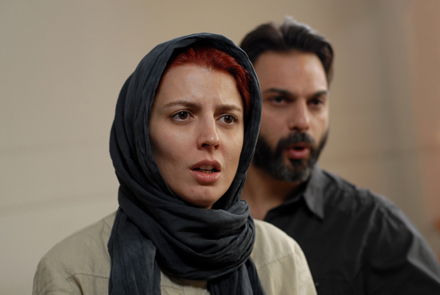![]()

An insightful gaze into the Iranian everyday
Iranian cinema was the revelation of the late 1980s and the early 1990s as it overwhelmed audiences with its emphasis on the everyday and unconstructed narrative. “A Separation” is the latest addition to a long list of penetrating dramas centering on the political through the personal directed by acknowledged masters of Iranian cinema like Mohsen Makhmalbaf and Abbas Kiarostami.
The narrative is dense. It begins with a married couple that choose to divorce when they disagree on the logistics of leaving Iran. Simin (Leila Hatami) longs to move abroad to ensure a better future for their daughter Termeh (Sarina Farhadi), whereas Nader (Peyman Moadi) insists on remaining in Iran to take care of his father who suffers from Alzheimer’s. Their lives are transformed when one day Razieh (Sareh Bayat) arrives to take care of Nader’s father and is accused of stealing money and is physically abused by Nader.
“A Separation” is a meditation on a single event and how its experience makes the characters already faced with a situation (i.e., divorce) encounter an unmediated experience of the real. This notion of the “real” is constituted by the mechanistic
workings of the Kafkaesque legal offices and jails in Tehran. Razieh and her husband Hodjat (Shahab Hosseini) are introduced to the audience before she is accused of stealing, but the event changes the social nature of their interaction into an increasingly legal one – one mediated in the presence of the legal system whose representative is the judge.
The film is careful in its handling of the contradictory nature of society in Iran, especially with regard to the society’s link with modernity. Characters live the materiality of the modern world while at the same time they have a deep-rooted faith in matters of the spirit. Director Asghar Farhadi is able to achieve a balanced view of the differences in the domestic space and the cityscape. An example of this is his handling of the interiority of the domestic space of the house and the randomized exteriority of the city epitomized by the machinery of the legal system. Like most Iranian filmmakers before him, he displays finesse in his handling of the everyday.
The most memorable moment in “A Separation” is the last sequence where Termeh must decide which parent she would like to live with after the divorce. The titles roll up as Nader waits outside unsure of his daughter’s decision.


Holland still can’t
see the light
Agnieszka Holland’s excruciatingly long “In Darkness” is another addition to the overpopulated list of films about the Holocaust. Set in the Polish city of Lvov, the film is a dramatization of burglar Leopold Socha’s attempt to rescue a set of Jewish refugees by way of the town’s sewers over a period of 14 months.
The film is Holland’s third attempt at the Holocaust genre after such critically acclaimed works as “Angry Harvest” (1985) and “Europa, Europa” (1990). Hollywood’s appetite for Holocaust films is evident in consistent Oscar nominations.
Adapted from Robert Marshall’s novel “In the Sewers of Lvov,” the film comes across as a rehash of Steven Spielberg’s “Schindler’s List.” Holland begins the film as a historical survey of the Polish occupation. The group of Jewish refugees forms a different and disconnected society not linked to the historical flow that pervades the rest of the film. The space in itself is split between the wideopen streets that define the exteriority of the town and the dingy, claustrophobic and exasperating interiority of the sewers.
Holland emphasizes the relationship between the individual and the group. The group has an identity antithetical to that of the individuals who comprise it who want to break free from the grid of sewers and be in the outside world even if it means death at the hands of the Nazis. The struggle lies in the fact that the individuals are bound to connect and form a bond resulting in the group. The group will acquire such a force that it will unintentionally move against the interests of the individuals that formed it.
Like in Holland’s earlier Holocaust work “Europa Europa,” sexuality is the link between ideology in the group and communal action, evoking the writings of Austrian psychiatrist and psychoanalyst Wilhelm Reich. Reich emphasized ideology rooted in the sexual. Holland represents the Jewish group as being sexually liberated and therefore not prone to Nazism which, according to Reich, came to power because of the sexual repression of the proletariat in Germany at the time.
The film uses extremely conventional techniques of dramatization, prioritizing the adaptation of Marshall’s novel through theatrical performances, over a sense of rhythm or mood. Holland’s approach is unresolved in its attitude towards character development within the logic of the narrative. The director fails to generate fluency with her material making the exaggerated actors appear like they have no ground beneath their feet.







